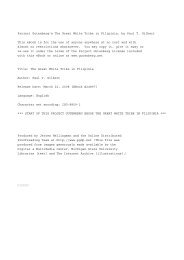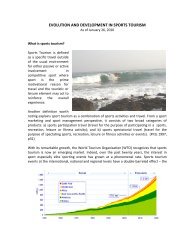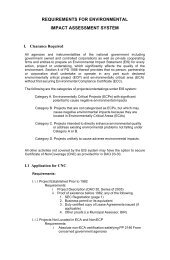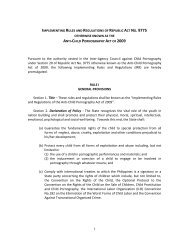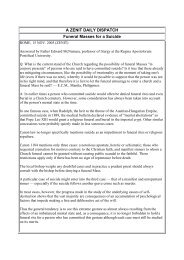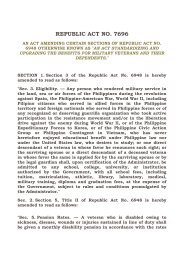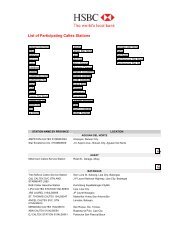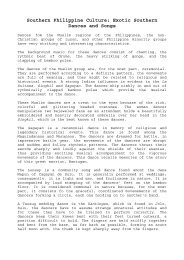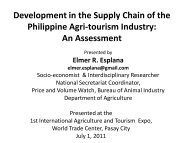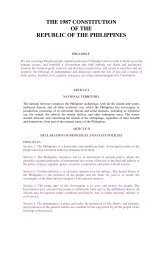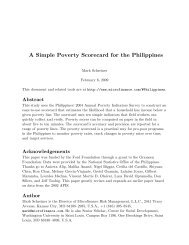philippine institute of tradtional and alternative health - About the ...
philippine institute of tradtional and alternative health - About the ...
philippine institute of tradtional and alternative health - About the ...
Create successful ePaper yourself
Turn your PDF publications into a flip-book with our unique Google optimized e-Paper software.
PHILIPPINE INSTITUTE OF TRADTIONAL AND ALTERNATIVE HEALTH CARE(PITAHC)www.doh.gov.ph/pitahc/pitahcmain.htmToward Clearer Vision to <strong>the</strong> Filipino PeopleThe importance <strong>of</strong> traditional medicine in providing essential <strong>health</strong> care to <strong>the</strong> peopleshould be recognized. At present, its use has tremendously exp<strong>and</strong>ed <strong>and</strong> gained wide globalacceptance <strong>and</strong> popularity. In <strong>the</strong> Philippines, <strong>the</strong> practice <strong>of</strong> traditional medicine which waspassed on from generation to generation has gained a deep significance in <strong>health</strong> deliveryconsidering <strong>the</strong> expensive western medical treatment which most Filipinos could not afford.The Department <strong>of</strong> Health (DOH), through former Health Secretary <strong>and</strong> incumbentSenator Juan M. Flavier, first came out with <strong>the</strong> Traditional Medicine (trad med) Program byvirtue <strong>of</strong> Administrative Order No. 12 in 1992. This special program was tasked to promote <strong>and</strong>advocate traditional medicine nationwide. In order to institutionalize <strong>the</strong> program, <strong>the</strong> drafting <strong>of</strong>a traditional medicine law started in 1994. In 1997, Pres. Fidel V. Ramos appreciating <strong>the</strong>potential <strong>of</strong> traditional medicine in our <strong>health</strong> <strong>and</strong> economy, included this as one <strong>of</strong> hisadministration's pole-vaulting strategies.The timely approval <strong>of</strong> <strong>the</strong> law (R.A 8423) o<strong>the</strong>rwise known as <strong>the</strong> Traditional <strong>and</strong>Alternative Medicine Act (TAMA) <strong>of</strong> 1997 gave rise to <strong>the</strong> creation <strong>of</strong> <strong>the</strong> Philippine Institute <strong>of</strong>Traditional <strong>and</strong> Alternative Health Care (PITAHC) a corporation attached to <strong>the</strong> DOH to answer<strong>the</strong> present needs <strong>of</strong> <strong>the</strong> people on <strong>health</strong> care through <strong>the</strong> provision <strong>and</strong> delivery <strong>of</strong> traditional<strong>and</strong> <strong>alternative</strong> <strong>health</strong> care (TAHC) products, services <strong>and</strong> technologies that have been provensafe, effective <strong>and</strong> affordable. Foremost among its objectives are:• To encourage scientific research on <strong>and</strong> develop traditional <strong>and</strong> <strong>alternative</strong> <strong>health</strong> caresystems that has a direct impact on public <strong>health</strong> care;• To promote <strong>and</strong> advocate <strong>the</strong> use <strong>of</strong> traditional /<strong>alternative</strong> <strong>health</strong> care modalities thathave been proven safe, effective, cost-effective <strong>and</strong> consistent with government st<strong>and</strong>ardson <strong>health</strong> care practice,• To develop <strong>and</strong> coordinate skills training courses for various forms <strong>of</strong> traditional <strong>and</strong><strong>alternative</strong> <strong>health</strong> care modalities,• To formulate st<strong>and</strong>ards, guidelines <strong>and</strong> codes <strong>of</strong> ethical practice appropriate for <strong>the</strong>practice <strong>of</strong> traditional <strong>and</strong> <strong>alternative</strong> <strong>health</strong> care as well as in <strong>the</strong> manufacture, qualitycontrol <strong>and</strong> marketing <strong>of</strong> different traditional <strong>and</strong> <strong>alternative</strong> <strong>health</strong> care materials, natural<strong>and</strong> organic products, for approval <strong>and</strong> adoption by <strong>the</strong> appropriate government agencies,
• To formulate policies for <strong>the</strong> protection <strong>of</strong> indigenous <strong>and</strong> natural <strong>health</strong> resources <strong>and</strong>technology, natural products, by-products <strong>and</strong> derivatives from unwarranted exploitation,for approval <strong>and</strong> adoption by <strong>the</strong> appropriate government agencies,• To formulate policies to streng<strong>the</strong>n <strong>the</strong> role <strong>of</strong> traditional <strong>and</strong> <strong>alternative</strong> <strong>health</strong> caredelivery system; <strong>and</strong>,• To promote traditional <strong>and</strong> <strong>alternative</strong> <strong>health</strong> care in international <strong>and</strong> nationalconventions, seminars <strong>and</strong> meetings.For year 2000, PITAHC's strategic directions were geared towards <strong>the</strong> following:• Nationwide TAHC promotion, advocacy <strong>and</strong> networking;• TAHC policy, st<strong>and</strong>ards, guidelines formulation, implementation <strong>and</strong> recommendation;• National research program implementation <strong>of</strong> TAHC;• Financing scheme networking <strong>and</strong> facilitation;• TAHC promotion <strong>and</strong> marketing;• TAHC clinical service delivery.PITAHC made <strong>the</strong> initial step in implementing its projects towards <strong>the</strong> achievement <strong>of</strong> itsobjectives. This year PITAHC proved its worthwhile beginning <strong>and</strong> commitment to pursue itsdirections. The biggest challenge however, is in <strong>the</strong> promotion <strong>and</strong> advocacy <strong>of</strong> TAHC. It is ourardent belief that we could achieve our goals through partnership with <strong>the</strong> community,government <strong>and</strong> <strong>the</strong> private sector.Only <strong>the</strong>n we can say that our vision <strong>of</strong> "Healthy <strong>and</strong> Productive Filipinos usingtraditional <strong>and</strong> <strong>alternative</strong> <strong>health</strong> care products, services, <strong>and</strong> technologies <strong>and</strong> still maintainingan enabling <strong>and</strong> caring environment" will be realized.Vision"Health for all Through Traditional <strong>and</strong> Alternative Health Care"Mission"PITAHC upholds <strong>the</strong> right <strong>of</strong> every Filipino for better <strong>health</strong> through <strong>the</strong> provision <strong>of</strong> safe,effective, <strong>and</strong> affordable traditional <strong>and</strong> <strong>alternative</strong> <strong>health</strong> care products, services <strong>and</strong>technologies."
M<strong>and</strong>ateRepublic <strong>of</strong> <strong>the</strong> PhilippinesCONGRESS OF THE PHILIPPINESMetro ManilaTenth CongressThird Regular SessionBegun <strong>and</strong> held in Metro Manila, on Monday <strong>the</strong> twentyeightday <strong>of</strong> July, nineteen hundred <strong>and</strong> ninety-seven.[REPUBLIC ACT NO.8423]An Act creating <strong>the</strong> PHILIPPINE INSTITUTE OF TRADITIONAL AND ALTERNATIVEHEALTH CARE (PITAHC) to accelerate <strong>the</strong> development <strong>of</strong> traditional <strong>and</strong> <strong>alternative</strong> <strong>health</strong>care in <strong>the</strong> Philippines, providing for a TRADITIONAL AND ALTERNATIVE HEALTHCARE DEVELOPMENT FUND <strong>and</strong> for o<strong>the</strong>r purposesBe it enacted by <strong>the</strong> Senate <strong>and</strong> House <strong>of</strong> Representatives <strong>of</strong> <strong>the</strong> Philippines in Congressassembled:Section I. Short Title. This Act shall be known as <strong>the</strong> "Traditional <strong>and</strong> Alternative MedicineAct (TAMA) <strong>of</strong> 1997".Article IGUIDING PRINCIPLESSection 2. Declaration <strong>of</strong> Policy. It is hereby declared <strong>the</strong> policy <strong>of</strong> <strong>the</strong> State to improve <strong>the</strong>quality <strong>and</strong> delivery <strong>of</strong> <strong>health</strong> care services to <strong>the</strong> Filipino people through <strong>the</strong> development <strong>of</strong>traditional <strong>and</strong> <strong>alternative</strong> <strong>health</strong> care <strong>and</strong> its integration into <strong>the</strong> national <strong>health</strong> care deliverysystem.It shall also be <strong>the</strong> policy <strong>of</strong> <strong>the</strong> State to seek a legally workable basis by which indigenoussocieties would own <strong>the</strong>ir knowledge <strong>of</strong> traditional medicine. When such knowledge is used byoutsiders, <strong>the</strong> indigenous societies can require <strong>the</strong> permitted Users to acknowledge its source <strong>and</strong>can dem<strong>and</strong> a share <strong>of</strong> any financial return that may come from its authorized commercial use.Section 3. Objectives. The objectives <strong>of</strong> this Act are as follows:(a) To encourage scientific research on <strong>and</strong> develop traditional <strong>and</strong> <strong>alternative</strong> <strong>health</strong> caresystems that have direct impact on public <strong>health</strong> care;
(b) To promote <strong>and</strong> advocate <strong>the</strong> use <strong>of</strong> traditional, <strong>alternative</strong>, preventive, <strong>and</strong> curative <strong>health</strong>care modalities that have been proven safe, effective, cost effective <strong>and</strong> consistent withgovernment st<strong>and</strong>ards on medical practice;(c) To develop <strong>and</strong> coordinate skills training courses for various forms <strong>of</strong> traditional <strong>and</strong><strong>alternative</strong> <strong>health</strong> care modalities;(d) To formulate st<strong>and</strong>ards, guidelines <strong>and</strong> codes <strong>of</strong> ethical practice appropriate for <strong>the</strong>practice <strong>of</strong> traditional <strong>and</strong> <strong>alternative</strong> <strong>health</strong> care as well as in <strong>the</strong> manufacture, quality control<strong>and</strong> marketing <strong>of</strong> different traditional <strong>and</strong> <strong>alternative</strong> <strong>health</strong> care materials, natural <strong>and</strong> organicproducts, for approval <strong>and</strong> adoption by <strong>the</strong> appropriate government agencies; .(e} To formulate policies for <strong>the</strong> protection <strong>of</strong> indigenous <strong>and</strong> natural <strong>health</strong> resources <strong>and</strong>technology from unwarranted exploitation, for approval <strong>and</strong> adoption by <strong>the</strong> appropriategovernment agencies;(f) To formulate policies to streng<strong>the</strong>n <strong>the</strong> role <strong>of</strong> traditional <strong>and</strong> <strong>alternative</strong> <strong>health</strong> caredelivery system; <strong>and</strong>(g) To promote traditional <strong>and</strong> <strong>alternative</strong> <strong>health</strong> care in international <strong>and</strong> nationalconventions, seminars <strong>and</strong> meetings in coordination with <strong>the</strong> Department <strong>of</strong> Tourism, Duty FreePhilippines, Incorporated, Philippine Convention <strong>and</strong> Visitors Corporation <strong>and</strong> o<strong>the</strong>r tourismrelatedagencies as well as non-government organizations <strong>and</strong> local government units.Article IIDEFINITION OF TERMSSection 4. Definition <strong>of</strong> Terms. As used in this Act, <strong>the</strong> following terms shall mean:(a) "Traditional <strong>and</strong> <strong>alternative</strong> <strong>health</strong> care" -<strong>the</strong> sum total <strong>of</strong> knowledge, skills <strong>and</strong> practiceson <strong>health</strong> care, o<strong>the</strong>r than those embodied in biomedicine, used in <strong>the</strong> prevention, diagnosis <strong>and</strong>elimination <strong>of</strong> physical or mental disorder.(b) "Traditional medicine" -<strong>the</strong> sum total <strong>of</strong> knowledge, skills <strong>and</strong> practice on <strong>health</strong> care, notnecessarily explicable in <strong>the</strong> context <strong>of</strong> modern, scientific philosophical framework, butrecognized by <strong>the</strong> people to help maintain <strong>and</strong> improve <strong>the</strong>ir <strong>health</strong> towards <strong>the</strong> wholeness <strong>of</strong><strong>the</strong>ir being, <strong>the</strong> community <strong>and</strong> society, <strong>and</strong> <strong>the</strong>ir interrelations based on culture, history,heritage, <strong>and</strong> consciousness. I(c) "Biomedicine" - that discipline <strong>of</strong> medical care advocating <strong>the</strong>rapy with remedies thatproduce effects differing from those <strong>of</strong> <strong>the</strong> diseases treated. It is also called 'allopathy,' 'westernmedicine,' 'regular medicine,' 'conventional medicine, ''mainstream medicine,' 'orthodoxmedicine,' or 'cosmopolitan medicine.'
(d) "Alternative <strong>health</strong> care modalities" - o<strong>the</strong>r forms <strong>of</strong> non-allopathic, occasionally nonindigenousor imported healing methods, though not necessarily practiced for centuries norh<strong>and</strong>ed down from one generation to ano<strong>the</strong>r. Some <strong>alternative</strong> <strong>health</strong> care modalities includereflexology, acupuncture, massage, acupressure, chiropractic, nutritional <strong>the</strong>rapy, <strong>and</strong> o<strong>the</strong>rsimilar methods.(e) "Herbal medicines" - finished, labeled medicinal products that contain as activeingredient/s aerial or underground part/s <strong>of</strong> plant or o<strong>the</strong>r materials or combination <strong>the</strong>re<strong>of</strong>,whe<strong>the</strong>r in <strong>the</strong> crude state or as plant preparations. Plant material includes 'juices, gums, fattyoils, essential oils, <strong>and</strong> o<strong>the</strong>r substances <strong>of</strong> this nature. Herbal medicines, however, may containexcipients in addition to <strong>the</strong> active ingredient(s). Medicines containing plant material(s)combined with chemically-defined active substances, including chemically-defined, isolatedconstituents <strong>of</strong> plants, are not considered to be herbal medicines.(f). "Natural product" - those foods that grow spontaneously in nature whe<strong>the</strong>r or not <strong>the</strong>y aretended by man. It also refers to foods that have been prepared from grains, vegetables, fruits,nuts, meats, fish, eggs, honey, raw milk, <strong>and</strong> <strong>the</strong> like, without <strong>the</strong> use or addition <strong>of</strong> additives,preservatives, artificial colors <strong>and</strong> flavors, or manufactured chemicals <strong>of</strong> any sort after harvest orslaughter.(g) "Manufacture" - any <strong>and</strong> all operations involved in <strong>the</strong> production, including preparation,propagation, processing, formulating, filling, packing, repacking, altering, ornamenting,finishing, or o<strong>the</strong>rwise changing <strong>the</strong> container, wrapper, or labeling <strong>of</strong> a consumer product in <strong>the</strong>fur<strong>the</strong>rance <strong>of</strong> <strong>the</strong> distribution <strong>of</strong> <strong>the</strong> same from <strong>the</strong> original place <strong>of</strong> manufacture to <strong>the</strong> personwho makes <strong>the</strong> final delivery or sale to <strong>the</strong> ultimate consumer.(h) "Traditional healers" - <strong>the</strong> relatively old, highly" respected people with a pr<strong>of</strong>oundknowledge <strong>of</strong> traditional remedies(i) "Intellectual property rights" - is <strong>the</strong> legal basis by which <strong>the</strong> indigenous communitiesexercise <strong>the</strong>ir rights 'to have access to protect, control over <strong>the</strong>ir cultural knowledge <strong>and</strong> product,including but not limited to, traditional medicines, <strong>and</strong> includes <strong>the</strong> right to receive compensationfor it.Article IIITHE PHILIPPINE INSTITUTE OFTRADITIONAL AND ALTERNATIVEHEALTH CARESection 5. Philippine Institute <strong>of</strong> Traditional <strong>and</strong> Alternative Health Care. There is herebyestablished a body corporate to be known as <strong>the</strong> Philippine Institute <strong>of</strong> Traditional <strong>and</strong>Alternative Health Care, hereinafter referred to as <strong>the</strong> Institute. The Institute shall be attached to<strong>the</strong> Department <strong>of</strong> Health. Its principal <strong>of</strong>fice shall be in Metro Manila, 'but it may establisho<strong>the</strong>r branches or <strong>of</strong>fices elsewhere in <strong>the</strong> Philippines as, may be necessary or proper for <strong>the</strong>accomplishment <strong>of</strong> its purposes <strong>and</strong> objectives.
Section 6. Powers <strong>and</strong> Functions. In fur<strong>the</strong>rance <strong>of</strong> its purposes <strong>and</strong> objectives, <strong>the</strong> Instituteshall have <strong>the</strong> following powers <strong>and</strong> functions:(a) To plan <strong>and</strong> carry out research <strong>and</strong> development activities in <strong>the</strong> areas <strong>of</strong> traditional <strong>and</strong><strong>alternative</strong> <strong>health</strong> care <strong>and</strong> its ultimate integration into <strong>the</strong> national <strong>health</strong> care delivery system;(b) To verify, package <strong>and</strong> transfer economically viable technologies in <strong>the</strong> field <strong>of</strong> traditional<strong>and</strong> <strong>alternative</strong> <strong>health</strong> care, giving emphasis on <strong>the</strong> social engineering aspects necessary forgroup endeavor;(c) To provide <strong>the</strong> database for policy formulation that will stimulate <strong>and</strong> sustain production,marketing <strong>and</strong> consumption <strong>of</strong> traditional <strong>and</strong> <strong>alternative</strong> <strong>health</strong> care products;(d) To organize <strong>and</strong> develop continuing training programs for physicians, nurses, pharmacists,physical <strong>the</strong>rapists, <strong>and</strong> o<strong>the</strong>r pr<strong>of</strong>essional <strong>health</strong> workers <strong>and</strong> students, as well as scientists,research managers <strong>and</strong> extension workers in <strong>the</strong> field <strong>of</strong> traditional <strong>and</strong> <strong>alternative</strong> <strong>health</strong> care;(e) To formulate policies that would create public awareness through educational activities,conventions, seminars, conferences, <strong>and</strong> <strong>the</strong> like by focusing on <strong>the</strong> promotion <strong>of</strong> <strong>health</strong>y livingfor preventing diseases, <strong>the</strong>reby uplifting <strong>the</strong> <strong>health</strong> care industry;(f) To acquire or obtain from any governmental authority whe<strong>the</strong>r national or local, foreign ordomestic, or from any person, corporation, partnership, association or o<strong>the</strong>r entity, such charters,franchises, licenses, rights, privileges, assistance, financial or o<strong>the</strong>rwise, <strong>and</strong> concessions as areconducive to necessary proper for <strong>the</strong> attainment <strong>of</strong> its purposes <strong>and</strong> objectives;(g) To receive <strong>and</strong> acquire from any person <strong>and</strong>/or government <strong>and</strong> private entities, whe<strong>the</strong>rforeign or domestic, grants, donations <strong>and</strong> contributions consisting <strong>of</strong> such properties, real orpersonal, including funds <strong>and</strong> valuable effects or things, as may be useful, necessary or proper tocarry out its purposes <strong>and</strong> objectives <strong>and</strong> administer <strong>the</strong> same in ,accordance with <strong>the</strong> terms <strong>of</strong>such grants, donations <strong>and</strong> contributions, consistent with its purposes <strong>and</strong> objectives;(h) To serve as <strong>the</strong> coordinating center <strong>of</strong> a national network <strong>of</strong> traditional <strong>and</strong> <strong>alternative</strong><strong>health</strong> care stations located in <strong>the</strong> different regions <strong>of</strong> <strong>the</strong> country;(i) To formulate a code <strong>of</strong> ethics <strong>and</strong> st<strong>and</strong>ards for <strong>the</strong> practice <strong>of</strong> traditional <strong>and</strong> <strong>alternative</strong><strong>health</strong> care modalities for approval <strong>and</strong> adoption by <strong>the</strong> appropriate pr<strong>of</strong>essional <strong>and</strong> governmentagencies;(j) To formulate st<strong>and</strong>ards <strong>and</strong> guidelines for <strong>the</strong> manufacture, marketing <strong>and</strong> quality control<strong>of</strong> different traditional <strong>and</strong> <strong>alternative</strong> <strong>health</strong> care materials <strong>and</strong> products for approval <strong>and</strong>adoption by <strong>the</strong> Bureau <strong>of</strong> Food <strong>and</strong> Drugs;(k) To coordinate with o<strong>the</strong>r institutions <strong>and</strong> agencies involved in <strong>the</strong> research on herbalmedicines;
(I) To adopt <strong>and</strong> use a corporate seal;(m) To sue <strong>and</strong> be sued in its corporate name;(n) To succeed by its corporate name;(o) To adopt its by laws <strong>and</strong> promulgate such rules <strong>and</strong> regulations as may be necessary orproper to implement this Act, <strong>and</strong> to amend or repeal <strong>the</strong> same from time to time;(p) To enter into, make <strong>and</strong> execute contracts <strong>and</strong> agreements <strong>of</strong> any kind or nature;(q) To borrow, raise or obtain funds, or to enter into any financial or credit arrangement inorder to support or carry out its research programs, finance its capital <strong>and</strong> operating expenses,subject to pertinent laws governing public debts <strong>and</strong> expenditures;(r) To invest, purchase or o<strong>the</strong>rwise acquire, own, hold, use, mortgage, pledge, encumber,sell, assign, convey, exchange, or o<strong>the</strong>rwise deal in real <strong>and</strong>/or personal properties <strong>of</strong> whateverkind <strong>and</strong> nature, or any interest <strong>the</strong>rein, including shares <strong>of</strong> stock, bonds, notes, securities <strong>and</strong>o<strong>the</strong>r evidences <strong>of</strong> indebtedness <strong>of</strong> natural or juridical persons, whe<strong>the</strong>r domestic or foreign <strong>and</strong>whe<strong>the</strong>r government or private;(s) To exercise all <strong>the</strong> powers <strong>of</strong> a corporation under <strong>the</strong> General Corporation Law, ins<strong>of</strong>ar assuch powers are not in violation <strong>of</strong> <strong>the</strong> provisions <strong>of</strong> this Act; <strong>and</strong>(t) To exercise such o<strong>the</strong>r powers <strong>and</strong> functions, <strong>and</strong> perform such o<strong>the</strong>r acts as may benecessary, proper or incidental to <strong>the</strong> attainment <strong>of</strong> its purposes <strong>and</strong> objectives.Section 7. Board <strong>of</strong> Trustees. The corporate powers <strong>of</strong> <strong>the</strong> Institute shall be exercised, <strong>and</strong> allits business, activities <strong>and</strong> properties shall be controlled by a Board <strong>of</strong> Trustees, hereinafterreferred to as <strong>the</strong> Board.(a) Composition. The Board shall be composed <strong>of</strong> <strong>the</strong> following:Secretary <strong>of</strong> Health -ex-<strong>of</strong>ficio chairmanPermanent representatives <strong>of</strong> <strong>the</strong> following government <strong>of</strong>fices:Department <strong>of</strong> Science <strong>and</strong> Technology;Department <strong>of</strong> Environment <strong>and</strong> Natural Resources;Department <strong>of</strong> Agriculture;Department <strong>of</strong> Education, Culture <strong>and</strong> Sports; <strong>and</strong>Commission on Higher Education.Representatives <strong>of</strong> <strong>the</strong> following industries/ sectors:
One ( 1) physician who is engaged in <strong>the</strong> practice <strong>of</strong> traditional <strong>and</strong> <strong>alternative</strong> <strong>health</strong> care;One ( I) member from a duly recognized -academe/ research institution engaged in traditional<strong>and</strong> <strong>alternative</strong> <strong>health</strong>care research;One (I) traditional <strong>and</strong> <strong>alternative</strong> <strong>health</strong> care practitioner who is not a physician;One (I) biomedical/allopathic/western medical practitioner preferably from <strong>the</strong> PhilippineMedical Association;One { I) member from <strong>the</strong> natural food industry <strong>and</strong>/or organic food industry; <strong>and</strong>One (I) member from <strong>the</strong> environmental sector organization.The six ( 6) members representing <strong>the</strong> above-mentioned sectors/industry shall be appointedby <strong>the</strong> President <strong>of</strong> <strong>the</strong> Philippines upon recommendation <strong>of</strong> <strong>the</strong> Secretary <strong>of</strong> Health. Of <strong>the</strong>appointive members, two (2) members shall have a term <strong>of</strong> three (3) years; <strong>the</strong> second two (2)members appointed shall each have a term <strong>of</strong> two (2) years; <strong>and</strong>, <strong>the</strong> third two (2) members shalleach have a term <strong>of</strong> one (1) year.Any member appointed to a vacancy shall serve only for <strong>the</strong> unexpired term <strong>of</strong> <strong>the</strong> memberwhom he/she shall succeed.(b) Meetings <strong>and</strong> quorum. The Board shall meet regularly at least once a month or as <strong>of</strong>ten as<strong>the</strong> exigencies <strong>of</strong> <strong>the</strong> service dem<strong>and</strong>. The presence <strong>of</strong> at least six (6) members shall constitute aquorum, <strong>and</strong> <strong>the</strong> majority vote <strong>of</strong> <strong>the</strong> members present, <strong>the</strong>re being a quorum, shall be necessaryfor <strong>the</strong> adoption <strong>of</strong> any resolution, decision or any o<strong>the</strong>r act <strong>of</strong> <strong>the</strong> Board.(c) Allowances <strong>and</strong> per diems. The members <strong>of</strong> <strong>the</strong> Board shall receive a per diem for everymeeting actually attended subject to <strong>the</strong> pertinent budgetary laws, rules <strong>and</strong> regulations oncompensation, honoraria <strong>and</strong> allowances.Section 8. Powers <strong>and</strong> Functions <strong>of</strong> <strong>the</strong> Board. The Board shall exercise <strong>the</strong> following powers<strong>and</strong> functions:(a) To define <strong>and</strong> approve <strong>the</strong> programs, plans, policies, procedures <strong>and</strong> guidelines for <strong>the</strong>Institute in accordance with its purposes <strong>and</strong> objectives, <strong>and</strong> to control <strong>the</strong> management,operation <strong>and</strong> administration <strong>of</strong> <strong>the</strong> Institute;(b) To approve <strong>the</strong> Institute's organizational structure, staffing pattern, operating <strong>and</strong> capitalexpenditure, <strong>and</strong> financial budgets prepared in accordance with <strong>the</strong> corporate plan <strong>of</strong> <strong>the</strong>Institute;
(c) To approve salary ranges, benefits, privileges, bonuses <strong>and</strong> o<strong>the</strong>r terms <strong>and</strong> conditions <strong>of</strong>service for all <strong>of</strong>ficers <strong>and</strong> employees <strong>of</strong> <strong>the</strong> Institute, upon recommendation <strong>of</strong> <strong>the</strong> DirectorGeneral <strong>and</strong> consistent with <strong>the</strong> salary st<strong>and</strong>ardization <strong>and</strong> o<strong>the</strong>r laws;(d) To appoint, transfer, promote, suspend, remove or o<strong>the</strong>rwise discipline any subordinate<strong>of</strong>ficer or employee <strong>of</strong> <strong>the</strong> Institute, upon recommendation <strong>of</strong> <strong>the</strong> Director General;(e) To create such committee or committees <strong>and</strong> appoint <strong>the</strong> members <strong>the</strong>re<strong>of</strong>, as may benecessary or proper for <strong>the</strong> management <strong>of</strong> <strong>the</strong> Institute or for <strong>the</strong> attainment <strong>of</strong> its purposes <strong>and</strong>objectives;(f) To determine <strong>the</strong> research priorities <strong>of</strong> <strong>the</strong> Institute consistent with <strong>the</strong> framework <strong>of</strong> itspurposes <strong>and</strong> objectives <strong>and</strong> in coordination with o<strong>the</strong>r government agencies; <strong>and</strong>(g) To exercise such o<strong>the</strong>r powers <strong>and</strong> functions !<strong>and</strong> perform such o<strong>the</strong>r acts as may benecessary or proper for <strong>the</strong> attainment <strong>of</strong> <strong>the</strong> purposes <strong>and</strong> objectives <strong>of</strong> <strong>the</strong> Institute, or as maybe delegated by <strong>the</strong> Secretary <strong>of</strong> Health.Section 9. Director General <strong>and</strong> O<strong>the</strong>r Officers. The Institute shall be headed by a DirectorGeneral who shall be appointed by <strong>the</strong> President <strong>of</strong> <strong>the</strong> Philippines upon recommendation <strong>of</strong> <strong>the</strong>Secretary 9f Health. The Director General shall have a term <strong>of</strong> six (6) years.The Director General shall be assisted by such Deputy Director General(s) <strong>and</strong> programmanagers/coordinators as <strong>the</strong> Board may determine to carry out <strong>the</strong> purposes <strong>and</strong> objectives <strong>of</strong>this Act.Section 10. Powers, Functions <strong>and</strong> Duties <strong>of</strong> <strong>the</strong> Director General.The Director General shall have <strong>the</strong> following powers, functions <strong>and</strong> duties:(a) To exercise overall supervision <strong>and</strong> direction over <strong>the</strong> implementation <strong>of</strong> all research <strong>and</strong>development programs <strong>of</strong> <strong>the</strong> Institute, <strong>and</strong> to supervise <strong>and</strong> direct <strong>the</strong> management, operation<strong>and</strong> administration <strong>of</strong> <strong>the</strong> Institute;(b) To execute contracts, including deeds that may incur obligations, acquire <strong>and</strong> dispose <strong>of</strong>assets <strong>and</strong> deliver documents on behalf <strong>of</strong> <strong>the</strong> Institute, within <strong>the</strong> limits <strong>of</strong> authority delegated tohim by <strong>the</strong> Board;(c) To implement <strong>and</strong> enforce policies, decisions, orders, rules <strong>and</strong> regulations adopted by <strong>the</strong>Board;(d) To submit to <strong>the</strong> Board an annual report <strong>of</strong> <strong>the</strong> Institute;(e) To submit to <strong>the</strong> Board an annual budget <strong>and</strong> such supplemental budget as may benecessary for its consideration <strong>and</strong> approval; <strong>and</strong>
(f) To exercise such o<strong>the</strong>r powers <strong>and</strong> functions <strong>and</strong> perform such o<strong>the</strong>r duties as may beauthorized or assigned by <strong>the</strong> Board.Section 11. Government Agency Support <strong>and</strong> Coordination. The Institute may, for <strong>the</strong>purpose <strong>of</strong> its research <strong>and</strong> development activities, obtain <strong>and</strong> secure <strong>the</strong> services <strong>of</strong> scholars,scientists <strong>and</strong> technical personnel <strong>of</strong> any unit <strong>of</strong> <strong>the</strong> Department <strong>of</strong> Health <strong>and</strong> o<strong>the</strong>r agencies <strong>of</strong><strong>the</strong> Philippine Government. Such personnel may be paid honoraria as may be fixed <strong>and</strong>authorized by <strong>the</strong> Board following <strong>the</strong> usual government rules <strong>and</strong> regulations governinghonoraria <strong>and</strong> allowances. The Institute shall also assist, cooperate <strong>and</strong> coordinate with o<strong>the</strong>rgovernment agencies, such as <strong>the</strong> Bureau <strong>of</strong> Food <strong>and</strong> Drugs <strong>of</strong> <strong>the</strong> Department <strong>of</strong> Health <strong>and</strong> <strong>the</strong>Philippine Council for Health Research <strong>and</strong> Development <strong>of</strong> <strong>the</strong> Department <strong>of</strong> Science <strong>and</strong>Technology for <strong>the</strong> implementation <strong>of</strong> <strong>the</strong> purposes <strong>and</strong> objectives <strong>of</strong> this Act.Article IVPROMOTION OF TRADITIONAL ANDALTERNATIVE HEALTH CARESection 12. Traditional <strong>and</strong> Alternative Health Care Advocacy <strong>and</strong> Research Program. TheInstitute shal1 promulgate a nationwide campaign to boost support for <strong>the</strong> realization <strong>of</strong> <strong>the</strong>objectives <strong>of</strong> this Act. It shall encourage <strong>the</strong> participation <strong>of</strong> non-government organizations intraditional <strong>and</strong> <strong>alternative</strong> <strong>health</strong> care <strong>and</strong> <strong>health</strong>-related projects. The Institute shall als<strong>of</strong>ormulate <strong>and</strong> implement a research program on <strong>the</strong> indigenous Philippine traditional <strong>health</strong> carepractices performed by "traditional healers" using scientific research methodologies.Section 13. St<strong>and</strong>ards for <strong>the</strong> Manufacture, Marketing <strong>and</strong> Quality Control <strong>of</strong> TraditionalMedicine. The Institute, in collaboration with <strong>the</strong> Bureau <strong>of</strong> Food <strong>and</strong> Drugs, shall formulatest<strong>and</strong>ards <strong>and</strong> guidelines for <strong>the</strong> manufacture, quality control <strong>and</strong> marketing <strong>of</strong> differenttraditional <strong>and</strong> <strong>alternative</strong> <strong>health</strong> care materials <strong>and</strong> products.Section 14. Incentives/or Manufacturers <strong>of</strong> Traditional <strong>and</strong> Alternative Health Care Products.Manufacturers <strong>of</strong> traditional <strong>and</strong> <strong>alternative</strong> <strong>health</strong> care products like herbal medicinal plantsshall enjoy such exemptions, deductions <strong>and</strong> o<strong>the</strong>r tax incentives as may be provided for under<strong>the</strong> Omnibus Investment Code, as amended.Section 15. Traditional <strong>and</strong> Alternative Health Care Development Fund. To implement <strong>the</strong>provisions <strong>of</strong> this Act, <strong>the</strong>re is hereby created a Traditional <strong>and</strong> Alternative Health CareDevelopment Fund which shall be used exclusively for <strong>the</strong> programs <strong>and</strong> projects <strong>of</strong> <strong>the</strong> Institute,in <strong>the</strong> amount <strong>of</strong> Fifty million pesos (P50,000,000.00) for <strong>the</strong> first year, Seventy-five millionpesos (P75,000,000.00) for <strong>the</strong> second year, <strong>and</strong> One hundred million pesos (P100,000,000,00)for <strong>the</strong> third year from <strong>the</strong> earnings <strong>of</strong> <strong>the</strong> Duty Free Philippines: Provided, that not more thanfifteen percent (15%) <strong>of</strong> said fund shall be used for administrative costs <strong>of</strong> <strong>the</strong> Institute.Thereafter, such amount as may be necessary to fund <strong>the</strong> continued implementation <strong>of</strong> thisAct shall be included in <strong>the</strong> annual General Appropriations Act.
Article VTRANSITORY PROVISIONSSection 16. Appointment <strong>of</strong> Board Members. Within thirty (30) days from <strong>the</strong> date <strong>of</strong>effectivity <strong>of</strong> this Act, <strong>the</strong> President <strong>of</strong> <strong>the</strong> Philippines shall appoint <strong>the</strong> members <strong>of</strong> <strong>the</strong> Board aswell as <strong>the</strong> Director General <strong>and</strong> Deputy Director General(s) .Section 17. Transfer <strong>of</strong> Functions <strong>of</strong> <strong>the</strong> Traditional Medicine Unit <strong>and</strong> O<strong>the</strong>r Related Units.Upon <strong>the</strong> establishment <strong>of</strong> <strong>the</strong> Institute, <strong>the</strong> functions, personnel <strong>and</strong> assets <strong>of</strong> <strong>the</strong> TraditionalMedicine Unit <strong>and</strong> all <strong>the</strong> pharmaceutical <strong>and</strong> herbal processing plants <strong>of</strong> <strong>the</strong> Department <strong>of</strong>Health shall be transferred to <strong>the</strong> Institute without need <strong>of</strong> conveyance, transfer or assignment.For <strong>the</strong> year during which this Act was approved, <strong>the</strong> unexpended portion <strong>of</strong> <strong>the</strong> budget <strong>of</strong> <strong>the</strong><strong>of</strong>fices, agencies <strong>and</strong> units merged shall be utilized for establishing <strong>the</strong> Institute <strong>and</strong> initiating itsoperations, including <strong>the</strong> formulation <strong>of</strong> <strong>the</strong> rules <strong>and</strong> regulations necessary for <strong>the</strong>implementation <strong>of</strong> this Act.Incumbent <strong>of</strong>ficials <strong>and</strong> employees <strong>of</strong> <strong>the</strong> affected <strong>of</strong>fices shall continue to exercise <strong>the</strong>irrespective functions, duties <strong>and</strong> responsibilities with <strong>the</strong> corresponding benefits <strong>and</strong> privileges.To <strong>the</strong> greatest extent possible <strong>and</strong> in accordance with existing laws, all employees <strong>of</strong> <strong>the</strong>affected <strong>of</strong>fices, agencies <strong>and</strong> units shall be absorbed by <strong>the</strong> Institute.Article VIMISCELLANEOUS PROVISIONSSection 18. Oversight Functions. The Institute shall submit to Congress an annualaccomplishment report which shall include <strong>the</strong> status <strong>of</strong> its priority researches <strong>and</strong> operation. In<strong>the</strong> exercise <strong>of</strong> its oversight functions, Congress may inquire into <strong>the</strong> programs <strong>of</strong> <strong>the</strong> Institute.Section 19. Implementing Rules <strong>and</strong> Regulations. Within thirty (30) days from <strong>the</strong> completion<strong>of</strong> <strong>the</strong>ir appointments, <strong>the</strong> Board shall convene <strong>and</strong>, in collaboration with <strong>the</strong> Department <strong>of</strong>Health -Traditional Medicine Unit, formulate <strong>the</strong> rules <strong>and</strong> regulations necessary for <strong>the</strong>implementation <strong>of</strong> this Act. Said rules <strong>and</strong> regulations shall be issued within one hundred eight(180) days from <strong>the</strong> date <strong>of</strong> <strong>the</strong> Board's initial meeting <strong>and</strong> shall take effect upon publication in anewspaper <strong>of</strong> general circulation.Section 20. Repealing Clause. All laws, decrees, executive orders, <strong>and</strong> o<strong>the</strong>r laws including<strong>the</strong>ir implementing rules <strong>and</strong> regulations inconsistent with <strong>the</strong> provisions <strong>of</strong> this Act are herebyamended, repealed or modified accordingly.Section 21. Separability Clause. If any provision <strong>of</strong> this Act is declared unconstitutional orinvalid, o<strong>the</strong>r provisions <strong>the</strong>re<strong>of</strong> which are not affected <strong>the</strong>reby shall continue in full force <strong>and</strong>effect.Section 22. Effectivity. This Act shall take effect fifteen (15) days following its publication in<strong>the</strong> Official Gazette or in at least two (2) newspapers <strong>of</strong> general circulation.
Approved:JOSE DE VENECIA, JR.Speaker <strong>of</strong> <strong>the</strong> House<strong>of</strong> RepresentativesERNESTO M. MACEDAPresident <strong>of</strong> <strong>the</strong> SenateThis Act, which is a consolidation <strong>of</strong> Senate Bill No.1471 <strong>and</strong> House Bill No.10070 wasfinally passed by <strong>the</strong> Senate <strong>and</strong> <strong>the</strong> House <strong>of</strong> Representatives on December 8, 1997.ROBERTO P. NAZARENOSecretary GeneralHouse <strong>of</strong> RepresentativesLORENZO E. LEYNES, JR.Secretary <strong>of</strong> <strong>the</strong> SenateApproved: December 09, 1997FIDEL V. RAMOSPresident <strong>of</strong> <strong>the</strong> Philippines
PROGRAMS AND PROJECTSHerbal Medicine Community-Based ProgramThe program focuses on <strong>the</strong> promotion <strong>and</strong> advocacy <strong>of</strong> ten (10) scientifically-provenmedicinal plants endorsed by <strong>the</strong> Department <strong>of</strong> Health, namely: Lagundi, Yerba Buena,Sambong, Tsaang Gubat, Niyug-niyugan, Bayabas, Akapulko, Ulasimang Bato, Bawang <strong>and</strong>Ampalaya. These medicinal plants include technology transfer on <strong>the</strong> preparation <strong>of</strong> herbaldocoction, syrup, ointment <strong>and</strong> soap <strong>and</strong> lectures on Sampung (10) Halamang Gamot.AcupunctureA traditional Chinese Medicine that uses needles in <strong>the</strong> treatment <strong>of</strong> common illnesseslike pain management, muskulo-skeletal disorders, stroke rehabilitation <strong>and</strong> bronchial asthma.Acupuncture is one <strong>of</strong> <strong>the</strong> forefront programs being promoted by <strong>the</strong> Institute. PITAHC alsoconducts comprehensive training on Basic Acupuncture for physicians.Massage TherapyA method <strong>of</strong> maintaining <strong>health</strong>, managing stress <strong>and</strong> alleviating pain by applyingpressure or massaging acupressure points on <strong>the</strong> body surfaces. PITAHC also conducts regularMassage Therapy Appreciation seminar for <strong>the</strong> general public every Thursday morning,likewise, a National Certification training on Acupressure will be conducted <strong>and</strong> accreditation <strong>of</strong>Massage Therapy Clinics will be established nationwide.O<strong>the</strong>r Complementary Health ModalitiesThe integration <strong>of</strong> o<strong>the</strong>r complementary <strong>health</strong> modalities in <strong>the</strong> <strong>health</strong> care deliverysystem as a component <strong>of</strong> Primary Health Care that are proven to be safe, beneficial, affordable<strong>and</strong> culturally-acceptable is <strong>the</strong> main thrust <strong>of</strong> this program.Philippine Indigenous Healing TraditionsPITAHC shall also document, research, develop, protect <strong>and</strong> promote safe, beneficial,affordable <strong>and</strong> culturally-acceptable indigenous healing traditions h<strong>and</strong>ed down by ancestors to<strong>the</strong> present generation.Health TourismIn partnership with government agencies particularly <strong>the</strong> Department <strong>of</strong> Tourism, <strong>the</strong>Department <strong>of</strong> Environment <strong>and</strong> Natural Resources, non-government organizations <strong>and</strong> <strong>the</strong>
private sector, PITAHC will promote, advocate <strong>and</strong> accredit traditional <strong>and</strong> <strong>alternative</strong> <strong>health</strong>care clinics that are proven to be safe, beneficial, affordable <strong>and</strong> culturally-acceptable. Theprogram shall focus on <strong>the</strong> healing aspect <strong>of</strong> hot springs, beach <strong>and</strong> forest resorts.Nutrition <strong>and</strong> Alternative Healthy LifestyleOlder persons, 40 years <strong>and</strong> over are <strong>the</strong> most greatly affected by nutrition-relatedlifestyle diseases, this was revealed by <strong>the</strong> FNRI-DOST 1998 National Nutrition Survey. In itseffort to address <strong>the</strong> situation, PITAHC will promote <strong>and</strong> <strong>and</strong> advocate <strong>the</strong> adoption <strong>of</strong> an<strong>alternative</strong> <strong>health</strong>y lifestyle through diet modification, regular physical, mental & spiritualexercise <strong>and</strong> stress management.Environmental Protection <strong>and</strong> PreservationThe Philippine rainforest is <strong>the</strong> major source <strong>of</strong> indigenous medicinal plants, <strong>the</strong>se plantsare being threatened <strong>of</strong> extinction by continuous use <strong>and</strong> misuse. Thus, PITAHC will pursue <strong>the</strong>protection, preservation <strong>and</strong> propagation <strong>of</strong> medicinal plants, through <strong>the</strong> establishment <strong>of</strong> a genebank; database for research activities on herbal medicine <strong>and</strong> by <strong>the</strong> development <strong>of</strong> a workablescheme on benefit-sharing on intellectual properties <strong>of</strong> indigenous communities.PRODUCTS / SERVICES / TECHNOLOGYOperationsPITAHC maintains four Herbal Processing Plants (HPP) namely: Cagayan Valley HerbalProcessing <strong>and</strong> Pharmaceutical Plant; Tacloban Herbal Processing <strong>and</strong> Pharmaceutical Plant;Davao Herbal Processing <strong>and</strong> Pharmaceutical Plant <strong>and</strong> Cotabato Herbal Processing <strong>and</strong>Pharmaceutical Plant. These plants are strategically located in <strong>the</strong> three major isl<strong>and</strong>s <strong>of</strong> <strong>the</strong>country <strong>and</strong> produces herbal medicines in dosage form that are proven safe, effective, affordable<strong>and</strong> consistent with government st<strong>and</strong>ards like Lagundi (300 mg) as anti-asthma <strong>and</strong> anti-cough,Sambong (250 mg) as anti-urolithiasis <strong>and</strong> diuretic <strong>and</strong> Tsaang Gubat (250 mg) as anti-motilitytablets.TrainingEnhancement <strong>of</strong> skills <strong>and</strong> capabilities <strong>of</strong> government, NGO <strong>and</strong> private <strong>health</strong> workers isone <strong>of</strong> <strong>the</strong> major thrusts <strong>of</strong> PITAHC. To provide continuous education among PITAHC staff,<strong>health</strong> workers <strong>and</strong> practitioners, <strong>the</strong> Institute <strong>of</strong>fers training on traditional <strong>and</strong> <strong>alternative</strong> <strong>health</strong>care modalities specifically on Herbal Medicine, Massage Therapy <strong>and</strong> Acupuncture.Technology TransferThrough its Social Enterprise Development (SED) Unit, PITAHC conducts technologytransfer activities in <strong>the</strong> different localities <strong>of</strong> <strong>the</strong> country as livelihood project particularly <strong>the</strong>
preparation <strong>of</strong> herbal decoction, syrup <strong>and</strong> ointment for Primary Health Care. Herbal soapmakingis also taught.STRATEGIC DIRECTIONS FOR YEAR 2002-2007Policy, St<strong>and</strong>ard Development <strong>and</strong> AccreditationPITAHC will continue to pursue <strong>the</strong> development <strong>of</strong> policies <strong>and</strong> st<strong>and</strong>ards onAcupuncture, Massage Therapy, Herbal Products <strong>and</strong> Medicines, Lifestyle Modification <strong>and</strong>o<strong>the</strong>r TAHC modalities. The development <strong>of</strong> Code <strong>of</strong> Ethics <strong>and</strong> St<strong>and</strong>ards <strong>of</strong> Practice for allTAHC modalities <strong>and</strong> Accreditation System will also be pursued. Review <strong>and</strong> recommendation<strong>of</strong> policies for <strong>the</strong> protection <strong>of</strong> indigenous <strong>and</strong> natural <strong>health</strong> resources <strong>and</strong> technologies willalso be done.Human Resource Development <strong>and</strong> EmpowermentTo ensure <strong>the</strong> performance <strong>and</strong> efficiency <strong>of</strong> <strong>the</strong> Institute as a government-owned <strong>and</strong>controlled corporation, staff development will be a major priority. Competitive personnelcompensation <strong>and</strong> benefit package will likewise be developed <strong>and</strong> ensured. As part <strong>of</strong> itscontinuous pursuit towards capability-building, a training framework <strong>and</strong> module on holistic<strong>health</strong> will be developed. In addition, nationwide training on Massage Therapy, basic <strong>and</strong>advance acupuncture <strong>and</strong> herbal medicine preparation <strong>and</strong> o<strong>the</strong>r TAHC modalities will beconducted regularly.Promotion, Advocacy <strong>and</strong> NetworkingIn its effort to create awareness among <strong>the</strong> Filipinos on <strong>the</strong> benefits <strong>of</strong> traditional <strong>and</strong><strong>alternative</strong> <strong>health</strong> care modalities that are considered safe, beneficial, affordable, culturallyacceptable<strong>and</strong> consistent with government st<strong>and</strong>ards on medical practice, <strong>the</strong> Institute willundertake national <strong>and</strong> international promotion <strong>and</strong> advocacy activities like tri-media advocacyon TAHC products, services <strong>and</strong> technologies; Information, Education & Communication (IEC)materials development, production <strong>and</strong> dissemination; periodic surveys <strong>and</strong> TAHC awareness,knowledge <strong>and</strong> practices <strong>and</strong> intra <strong>and</strong> intersectoral coordination/networking.Research <strong>and</strong> DevelopmentIn partnership/collaboration with <strong>the</strong> academe <strong>and</strong> commercial institutions, PITAHC alsoplans <strong>and</strong> carry-out <strong>of</strong> contract-out research in <strong>the</strong> areas <strong>of</strong> traditional, <strong>alternative</strong> <strong>and</strong>complementary <strong>health</strong> care modalities to realize <strong>the</strong> Institute's ultimate dream <strong>of</strong> TAHC'sintegration into <strong>the</strong> national <strong>health</strong> care delivery system. A Quality Assurance System to includea quality testing center will also be developed. A research <strong>and</strong> resource coordinating system willlikewise be establish, results <strong>of</strong> <strong>the</strong>se researches will also be disseminated.Herbal Production <strong>and</strong> Marketing
Herbal Processing <strong>and</strong> Pharmaceutical Plants' facilities <strong>and</strong> equipment will be upgradedto ensure continuous production <strong>and</strong> manufacture <strong>of</strong> quality herbal medicine. The production <strong>of</strong>o<strong>the</strong>r forms <strong>of</strong> herbal medicine products will also be pursued. An effective <strong>and</strong> efficientmarketing plan will be developed <strong>and</strong> feasibility studies <strong>and</strong> nationwide implementation in ruralareas <strong>of</strong> agri-business will be undertaken.Information Technology Systems DevelopmentThe need for PITAHC programs <strong>and</strong> projects to be competitive also calls for <strong>the</strong>development <strong>and</strong> improvement <strong>of</strong> its information technology facilities <strong>and</strong> systems, in order toachieve <strong>the</strong> aforementioned goal, PITAHC will pursue systems, s<strong>of</strong>tware, database <strong>and</strong> networkdevelopment as well as information <strong>and</strong> document management.Corporate Financial Management <strong>and</strong> Resource GenerationAs a government owned <strong>and</strong> controlled corporation, PITAHC need not be dependent ongovernment subsidy, hence, PITAHC shall undertake income generating activities, source outexternal funds <strong>and</strong> develop an effective <strong>and</strong> efficient system for its sustainability.



